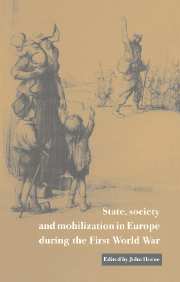Book contents
- Frontmatter
- Contents
- List of contributors
- Preface
- 1 Introduction: mobilizing for ‘total war’, 1914–1918
- I National ideals
- II Solidarities and minorities
- 5 Mobilizing labour and socialist militants in Paris during the Great War
- 6 Between integration and rejection: the Jewish community in Germany, 1914–1918
- 7 Wackes at war: Alsace-Lorraine and the failure of German national mobilization, 1914–1918
- III Army and nation
- IV The limits and consequences of mobilization
- Notes
- Index
5 - Mobilizing labour and socialist militants in Paris during the Great War
Published online by Cambridge University Press: 04 December 2009
- Frontmatter
- Contents
- List of contributors
- Preface
- 1 Introduction: mobilizing for ‘total war’, 1914–1918
- I National ideals
- II Solidarities and minorities
- 5 Mobilizing labour and socialist militants in Paris during the Great War
- 6 Between integration and rejection: the Jewish community in Germany, 1914–1918
- 7 Wackes at war: Alsace-Lorraine and the failure of German national mobilization, 1914–1918
- III Army and nation
- IV The limits and consequences of mobilization
- Notes
- Index
Summary
Introduction
Wartime mobilization, which is taken here to mean that of the home front, was an essentially ambiguous process. Mobilization could be conceived of as undertaken by the dominant forces in society, by different elements of the state including what used to be known as the ideological apparatus (a term that has too readily gone out of fashion). There is much evidence for such a view – including most obviously at the ideological level, the discourse of propaganda. Nonetheless, if the idea of a social contract is accepted as having validity in the French case, the state must to some extent be seen as reflecting general opinion, even if it also forms the latter. The same point can be made about the press, which is often the subject of a dual and ambiguous interpretation. Historians alternate between seeing it as an instrument of propaganda and as a reflection of its own readership, without always clarifying the reciprocal status and interplay of these two views. The press can indeed be seen as a mobilizing agent by virtue of its propaganda while at the same time reflecting the self-mobilization of its own readership. Are strident headlines or nationalist, xenophobic cartoons urging the war to be fought to the bitter end best considered as a simple means of indoctrinating opinion or as the expression of the thoughts and expectations of the readers? These uncertainties are added to in wartime by the effects of censorship and self-censorship (in itself a complex phenomenon), and such difficulties become an argument for taking another path, though one which is not without its own problems.
- Type
- Chapter
- Information
- Publisher: Cambridge University PressPrint publication year: 1997



